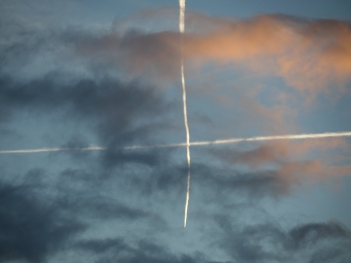We are now into the sixteenth year of the twenty first century, but it’s hard to believe it. Mankind has created the most scientific and technological society that has ever existed on this planet, and yet we are still surrounded by primitive superstition that would stop it dead in its tracks if it can ever get away with it.
Although I was brought up within a religious and superstitious family, I was able to notice after I left school and got out into the big wide world that the religious beliefs, superstition and, frankly, bigotry that I was taught as I was growing up, just didn’t match my own observations. And after several decades of those observations, I conclude that reality, supported by testable and confirmable evidence, is more reliable than (and preferable to) untestable and unconfirmable belief or faith.
Look around you and notice things. While the religious zealots are torturing and killing people, science has landed a spacecraft on a comet half a billion miles from Earth. It’s easier, I’m sure (although I couldn’t do it myself), to kill someone in the name of some god or other than it is to study science for years and do positive things that no amount of prayer will ever achieve.
Is the paranormal real? It’s certainly easier to make excuses for why psi claims don’t actually work than it is to produce the claimed effects. And just as easy to whine that those like me – sceptics – are just nay-saying curmudgeons who are just “desperate to protect their world view.”
Do the quack nostrums of homeopathy, chiropractic, faith healing, reiki and all the rest of the nonsense peddled for profit by (maybe some) well-meaning but unqualified (in scientific terms) practitioners do any real good for people? Someone suffering an ailment might be able to say honestly during such treatment (self-reporting) that they actually “feel better” as they undergo that “treatment,” but that is not the same as actually being cured. Germs and cancers do not disappear as a result of quackery, even if the sufferer has, as they often say, even with the latest medical treatment, “good days and bad days.”
Will your horoscope in the daily newspaper really be accurate today? Or maybe it would be better to pay through the nose for a personalised chart that will give you nothing other than a self-fulfilling prophecy – as long as you interpret it in the way that confirms your expectations and beliefs after the events you think they are predicting.
It could be that you will consult any pro paranormal website or blog that tells you why sceptics are “wrong in their beliefs” but don’t provide any testable evidence for that claim, which is really just sour grapes because the woomeisters have to face the fact that rational, scientifically literate people don’t go along with belief over testable evidence.
I could go on and on about all of the superstitions people prefer over actual reality, but by now if you have read this far, you might be starting to understand my frustration. I am one of those people that the paranormal promoters call, disdainfully, a “materialist!” Even worse than that, I am what they call (gasp, shock-horror) a “pseudosceptic,” one of those rationalists who don’t believe without question the paranormal anecdotes presented to me.
What can I say to it all, except, do you deny that the universe we inhabit does, in fact, have an actual material existence? I have to wonder why, but get no answer to the question, how can the “immaterial” exist for a start off, and how can it affect or interact with, the actual material (real) universe we all live in? Why don’t the physical laws of nature prevail over the immaterial (non-existent) “laws” of, er… the paranormal? In fact, what (physical or non-physical) laws control this immaterial paranormal “energy” or whatever it is? Where is the actual theory of the paranormal? (And when I say theory, I mean “theory” in the scientific sense.)
There is no such theory. A scientific theory can exist only if there is something there that can be shown (with a high degree of probability) to exist. At the moment, as has been going on for over a hundred and fifty years, paranormal investigators are still trying to show that there is anything paranormal going on at all. None of that has been demonstrated conclusively; so far, there is no compelling reason to think any of it is true.
And yet, no one needs any supposedly precognitive ability to just know that the year 2016 is going to be another non-stop tsunami of woo. That will include everything from serious paranormal researchers failing again to prove their claims, to outright frauds bilking the gullible for personal profit. There will also of course be well-meaning but off-beam believers spouting incorrect claims supported by totally wrong assumptions about the nature of, well… nature itself.
I will say this yet again: I do not believe in the existence of the paranormal or the supernatural, but my mind can be changed if anyone can prove the claims they make. However, those claims will have to meet the rigorous standards required by science, which does not mean someone’s heartfelt belief, or a single experiment that no one else can replicate, or an anecdote from some “eminent person of good character,” or any number of ad hoc rationalisations to explain what is maybe anomalous but not necessarily paranormal.
And don’t get me started about conspiracy theories:
“Chemtrails for Jesus,” perhaps.
In 2016 we are going to see more TV shows, books, and everything else about UFOs, ghosts, and all manner of irrational nonsense, supported by ignorant people who are willing to subscribe to it all and therefore pay for and perpetuate a kind of mind-numbing, modern-day “opiate for the masses.” Sensible programming about science – the true reality programmes – are (still) going to be side-lined, or given the least prominence because actual reality does not have the same commercial value to TV producers. That’s a shame, but it illustrates the problem.
For the forthcoming year of 2016 CE, I wish all of my readers a Rational New Year and freedom from Bad Thinking, while I continue trying to do my bit to fly the flag of reason. Wish me luck. (No, not luck, it doesn’t work like that… er, no, it really doesn’t; it’s a struggle.)





Nice post. If ever it crossed my mind to write a blog I’d remember not to bother; you say what I think but much better than I can put it.
I don’t know if you’ve read Jerry Coyne’s book Faith vs Fact that came out last year (http://www.amazon.co.uk/Faith-Versus-Fact-Religion-Incompatible-ebook/dp/B00O4RHN64/ref=cm_cr_pr_product_top?ie=UTF8h) but it puts a real dent in the, largely passive but generally accepted, notion that science and religion are compatible? His term for this is accommodationism and, boy, does he kick it into touch. I think it’s another big step in the battle with religion (which is what we have if we lay claim to reason), in that he shows that at every level science and religion are totally incompatible. As he points out, many scientists themselves have religious belief, but this serves only to demonstrate how even reasonable people can compartmentalise their lives. He puts it rather nicely that they ‘leave their reason at the church door each Sunday’.
As for paranormal claims, I’m completely willing to accept them as factually descriptive of given events provided they are properly evidenced. The trouble is that supporters of the paranormal don’t seem to have the slightest clue as to what is meant by the term ‘evidence’ and so become resentful at those that doubt them.
LikeLike
Geoff, thanks for your kind comments.
I haven’t (yet) read Jerry Coyne’s book, but I think I am likely to agree with him; in fact, I have been thinking of writing about my own thoughts on the subject.
Many religious believers tend to quote the fact that a lot of the great scientists in history were very pious people who had deeply-held religious convictions. Names commonly trotted out include Isaac Newton, Michael Faraday, etc.
In response, I point out that none of the scientists routinely mentioned ever invoked any supernatural “explanations” for their observations of nature. And that is a key point: science does not attempt to explain nature; rather, science describes nature. Newton, for example, stated that he was not trying to explain why nature is the way it is; he saw his work as merely discovering what his particular god (the Christian God) had put in place.
There is a subtle difference between the “why” and the “how” of what is all around us. I’m OK with the idea that some scientists think that a god created the universe, as long as they have the same outlook as their scientific predecessors. Those scientists do tend to be deists rather than theists; if they see themselves as merely “discovering” what they believe their alleged god created, that’s fine by me.
What you will certainly not find in a scientific research paper is any reference to miracles or the supernatural; why gravity exists is one thing, how it is affected by bodies with mass is another.
When the believers claim that this or that scientist was very religious, that claim is nothing more than a logical fallacy called a red herring – an irrelevant argument to distract attention from the main issue. If a scientist is religious, then so what – as long as he is supporting his research with mathematics (testable) rather than an appeal to the supernatural (untestable).
Think of it this way: Einstein’s most famous equation is E=mc2, not “a miracle happens.”
As far as paranormal claims go, I agree with you that the woo people have no idea about what counts as evidence. There are observations of anomalous events, but the believers usually try to confirm their paranormal hypotheses rather than using the scientific principle of falsification. It’s too easy to find confirming evidence of just about anything, but it takes an intake of breath and a dedication to finding out the truth of the matter to be able to reject one’s personal belief in favour of the truth (whatever it might happen to turn out to be). It takes integrity and sometimes bravery for a person to say, “I got it wrong.”
LikeLike